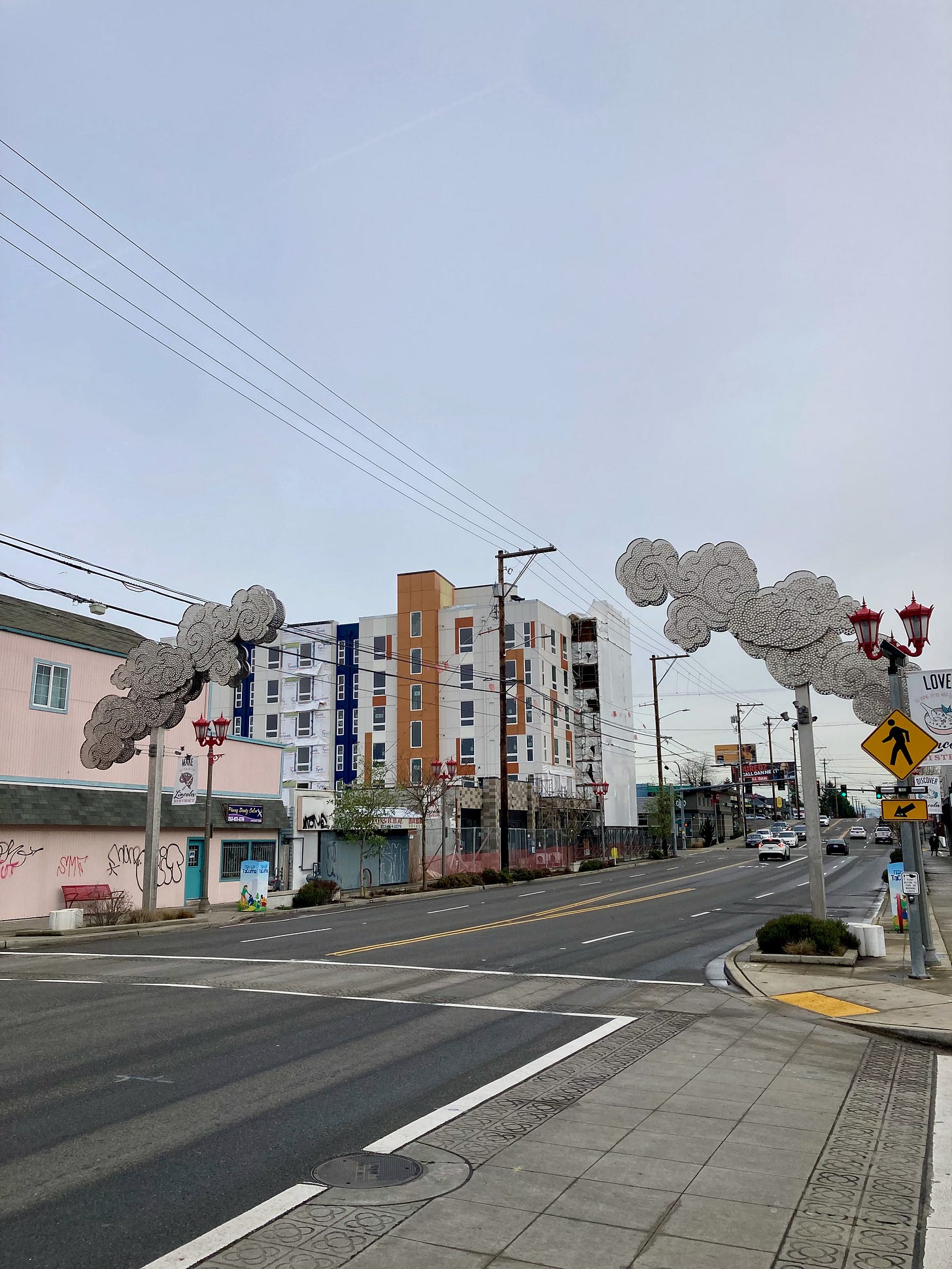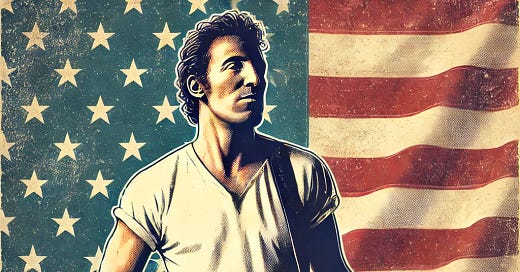Patriotism and Bruce Springsteen
Like most Americans, I grew up with patriotism in my blood. My father, a career Army officer, always had the American flag posted outside our door. Even at a young age, I understood the importance of never letting the flag touch the ground. There was something almost sacred about the stars and stripes that I simply took for granted. As a sixth grader on a military base in Hawaii, I assembled with my classmates at the end of the year and sang a spirited rendition of Lee Greenwood’s “God Bless the USA.” While my memory of that day is fuzzy, I have no doubt that our patriotic display warmed the hearts of hundreds of parents standing in the tropical heat. Later, as an eighteen year-old ROTC cadet in college, I performed a whole host of rituals in which the flag, the national anthem, and veneration of fallen soldiers in past wars took center stage. I would go on to be deeply immersed in military culture through my mid-twenties while serving as an Air Force officer. In this environment, a fierce patriotism was simply assumed, no examination required.
I am now thirty-eight. I have lived through four different presidential administrations as an adult, have watched multiple foreign wars come and go (and participated in one myself), have traveled widely around the world, and have been enriched by marriage to a woman who has helped met to see different points or view. These experiences have forced an evolution in my view of patriotism. In the summer of 2020, Sara and I marched in one of the largest political demonstrations ever seen in Washington DC, protesting the murder of George Floyd by a Minneapolis police officer and other incidents of racial injustice. I had never taken part in a political event before, but felt compelled to do so in this instance by my growing awareness of our country’s racial inequities. Since then, I have watched as cultural fights over school curriculum, diversity programs, and public statues have engulfed our country, dividing America into “woke” and “anti-woke” camps with radically different conceptions of our nation’s past, present, and future. While one side has embraced the flag, wrapping itself in a simple-minded patriotism that glosses over the ugly side of American history, the other side increasingly recoils at any overt displays of patriotism, insisting that one cannot be proud of a nation that is so deeply flawed. The space in the middle, which I have struggled to occupy, seems to be shrinking in the face of hyper partisan warfare.
This search for the middle ground is one reason why, for the past six years, I have gravitated to the music of Bruce Springsteen. The man is in his mid-seventies now, and his cultural influence has waned considerably since “Born in the USA.” That album was released in 1984, two years before I was born, but as an elder millennial I still see Springsteen as more relevant than ever: as a poet and a prophet, someone who can reconcile the best and worst of America, often in the same song. It is a rare gift, but one that is sorely needed now in an age that is contemptuous of ambiguities and obsessed with moral certainty. In his book “There Was Nothing You Can Do,” music journalist Steven Hyden notes that the Boss was the “last great centrist rockstar,” someone who could appeal to people of different political convictions by both celebrating and critiquing America. Springsteen’s oeuvre is large enough to keep music analysts busy for decades, but hand-picking a few notable Boss songs can, I think, provide some useful lessons on patriotism.
In “Land of Hope and Dreams” and “Working on a Dream,” Springsteen sings, as he often does, from the perspective of the everyman. The protagonist in “Land of Hope and Dreams” is riding aboard a train, chasing sunlight and the promise of a better tomorrow. “Meet me in the land of hopes and dreams,” sings the Boss, who then reviews the train’s passenger list: saints and sinners, losers and winners, fools and kings. It’s pretty clear that the train is America itself, people from all walks of life are aboard, and there is a shared destiny that unites this band of ragtag sojourners. The overall tone is one of optimism: “This train, dreams will not be thwarted / “This train, dreams will be rewarded.” Similarly, “Working on a Dream” puts Springsteen in the shoes of a blue-collar laborer doing his best to provide for his family. His identity is unclear, but he could easily be a recent immigrant. His ambition is undiminished by adversity, and he affirms to his love that he will build the future that they both so desperately want. I see the song as an expression of hope in America’s promise.
The idea of America as the promised land, the place where dreams can be spun from thin air, is central to my idea of patriotism. My own family history is illustrative. My great-grandfather was pulled to America, seeking the fabled land of opportunity. Immigrating from southern China to Seattle in the 1930s, he joined the American navy at the outbreak of World War II and served three years in the Pacific. Decades later, he would recount to me the terror of watching Japanese kamikaze pilots raining down from the sky. After the war, he sent for his wife and two sons and, like millions of immigrants before and since, set out in the pursuit of the American dream. He eventually opened several successful Chinese restaurants in Tacoma, making enough money to retire comfortably. As a child, I looked up to him as the elder patriarch in the family, a man whose frailty in old age belied the stamina and hardscrabble resilience of his younger years. Tom Yau was a self-made man who forged his own destiny, and America gave him the opportunity to do so. Millions of other immigrants have similar stories. For them, and for their descendants, America has been and continues to be the promised land.

While the promised land metaphor makes sense for immigrants, it is less true for African-Americans. In all honesty, I never thought much about race until the past few years. Growing up, I was conscious of my Asian identity, but it never adversely affected society’s perception of me. I had few interactions with African Americans throughout my childhood, and my knowledge of America’s fraught racial history remained woefully deficient even through my mid thirties. I managed to fill in these gaps by living in Washington DC, a majority black city, and developing friendships with African-Americans through Sara’s social network. Floyd’s murder galvanized me to rethink the ways in which America has failed to live up to its founding creed that all men are created equal. I began to read extensively, learning much from Richard Rothstein’s “Color of Law,” a study of racism in government housing policy, Isabel Wilkerson’s magisterial “The Warmth of Other Suns,” an oral history of the great migration of black Americans out of the South in the twentieth century, and Wilkerson’s provocative companion book, “Caste.” Through these and other authors I learned of the ways in which our country’s institutional racism inhibited advancement of African-Americans through discriminatory policies related to real estate lending and residential zoning. The cumulative terror inflicted by lynching, “black codes” (ostensibly neutral laws designed to disproportionately criminalize black people), and Jim Crow in the decades after the civil war relegated African-Americans to second class citizens, especially (but by no means exclusively) in the deep South. Despite much progress, our racial caste system persists to this day, with African-Americans continuing to face prejudice in the job market and the criminal justice system.
The previous two songs, while hopeful in tone, are also tinged with melancholy. “This train carries losers and winners / This train carries the broken-hearted,” sings Springsteen. Again, the dream “seems so far away,” laments the blue collar working man, which hints at America’s unrealized promise, even for those who have sweat and bled to earn a better life. These songs do not address race, but they do cause one to pause and reflect on who has been left out of the American dream. My revised view of patriotism has been informed by our nation’s failure to uphold the dignity of black Americans. Even as we rightly celebrate progress – the 1964 Civil Rights Act, for example – I believe we have a patriotic duty to fix structural barriers to racial equality. Only then can we hope for a more perfect union.
Too often, patriotism devolves into ritualistic platitudes that don’t stand up to scrutiny. We can proclaim America as the “greatest country in the world,” a familiar refrain that is the spiritual core of Lee Greenwood’s song, but what does this mean in practice? How are we defining greatness? If by “greatest country” we mean the most powerful, there is no question that America is on top. In many cases, this has been to the world’s benefit. American military might defeated European fascism and Japanese imperialism in the 1940s and kept the Soviets behind the Iron Curtain during the Cold War. Nevertheless, the temptations of superpower status have led us to trample on human dignity in faraway lands, from Vietnam in the 60s to Central America in the 80s to Iraq in the 2000s. Thousands of innocent people have died from US bullets and bombs in these conflicts and others, even as we thought we knew what was best for nations thousands of miles from our borders. With this in mind, I think we need to carefully examine how patriotism can easily slide into jingoistic nationalism.
“Born in the USA,” arguably Springsteen’s most famous song, attempts to straddle the line between celebration of America and self-criticism. It is not a simple-minded anthem of American greatness, but rather a despairing meditation on foreign wars of aggression (“they put a rifle in my hand, to go and kill the yellow man”), the exploitation of the working man as cannon fodder by our leaders (“born in a dead man’s town”), and the dislocation and neglect that so many veterans experience upon their return home to civilian life (“I’m ten years burning down the road, nowhere to run ain’t got nowhere to go”). In spite of the despondent lyrics, the euphoric power of the song makes you want to proudly wave the American flag. The song’s singular refrain (“I was born in the USA”) affirms American identity and urges us, collectively, to do better. There is self-reflective patriotism here that often get’s missed. Indeed, as Hyden notes in his book, “Born in the USA” is Springsteen’s most misunderstood song.

“Born in the USA” addresses excesses abroad and neglect at home. The latter is something that I have become acutely aware of as an adult. We extoll freedom, and we can rightly be proud about our system of checks and balances and the regularity of democratic elections to hold our leaders accountable. Ditto freedom to worship whatever God we want, in whatever form, and the right to speak our mind, even when it’s unpopular. These are not small matters. But it is worth asking: how free can a country actually be when tens of millions of Americans can’t afford basic health care? Our life expectancy is among the lowest of all developed countries (at least four years lower than the European average), and our social safety net can’t even ensure basic protections such as paid parental leave. We endure year after year of horrific gun violence, leaving parents to wonder if they can safely send their kids to school. Freedom from fear and economic security are at least as important as freedom of speech and freedom of religion, and yet our society venerates the latter while devaluing the former. Americans pay some of the lowest tax rates per capita of any developed country, leaving too little in the coffers to provide a stronger social safety net that would catch the most vulnerable.
In “We Take Care of Our Own” (2012), Springsteen tackles the desolation of an America that is indifferent to the plight of the vulnerable. The narrator is a man who is desperately looking for signs of compassion and community in a time of economic hardship, but there are few to be found. “I’ve been stumblin’ on good hearts turned to stone,” he sings. “There ain’t no help, the calvary’s stayed home.” As with “Born in the USA,” this song includes a refrain in the chorus that seemingly contradicts the despair of the verses: “We take care of our own, wherever this flag is flown.” It’s a call to action, an exhortation for America to live up to its ideals and build a compassionate society that gives a helping hand to those in need. Patriotism, in my view, can extoll freedom while also recognizing how a single-minded devotion to individualism leaves gaping holes in our social contract.
One of my favorite Springsteen songs, “The Rising” from 2002, is a post-9/11 anthem that centers on the resilience of the American spirit in the face of adversity. Here is the America of compassion that is lacking in “We Take Care of Our Own.” The narrator of “The Rising” is an emergency responder running into the fire to help those in need. “Come on up for the rising,” he sings. “Come on up, lay your hands in mine.” He is ready and willing to shoulder a burden that is too great for others to bear. Moreover, he invites the listener to rise with him. There is a sense of invitation, as if, together, they can overcome the trauma around them. Later in the song, this same sense of solidarity is invoked again: “May I feel your arms around me / May I feel your blood mix with mine / A dream of life comes to me / Like a catfish dancing on the end of the line.”
“The Rising” expresses the kind of subtle patriotism that has come to definite my views. It is not a flag-waving tribute to American greatness, but instead a reflective meditation on what actually makes us great. We are great when we faithfully upholding our ideals, valuing the dignity of every person in our country: the refugee seeking a better life, the single mom struggling to afford health insurance, the young black man stopped by the police for dubious reasons. We should rightly be proud of our country and the progress it has made, while also carefully examining ourselves in the mirror and acknowledging our many shortcomings. We can hold both truths simultaneously, as Springsteen does in “Born in the USA,” and this does not lessen our patriotism.
When I look at the American flag today, I choose to see the best of America: its embrace of immigrants, its hardworking and entrepreneurial spirit, its commitment to individual freedom and equality that, slowly but surely, has expanded to include non-white Americans, women, and LGBT individuals. The flag belongs to no political party. I do believe, even in an age of intense polarization, that there is a common creed that can bring together most Americans. While Hyden writes with despair about the “death of the heartland” and the inability of Americans to find common ground, I believe that most Americans, like the Boss, have a balanced view of patriotism: ready to recognize America’s flaws but at the same time proud to be born in the USA. A healthy patriotism keeps an eye on our founding ideals – freedom and equality – and seeks to redress the places where we are failing to realize the American dream.
“In the end, nobody wins, unless everybody wins,” was the motto of Springsteen’s Born in the USA tour in the 1980s, a call to build a society based on solidarity, where everyone gets a fair shot at the American dream. It is, I think, exactly the right approach for our troubled times. If there was ever a time to reframe patriotism in a way that can appeal to both sides of our cultural divide, the time is now. Springsteen is a national treasure, and there will be no replacement for him when he has hung up his guitar for good, but the self-reflective patriotism that he represents will, I hope, long outlast him. I, for one, will have “The Rising” on my playlist for the rest of my days: a reminder to dream big, acknowledge our flaws, and maintain faith in the American spirit, striving every day to build a more just society.



